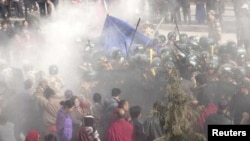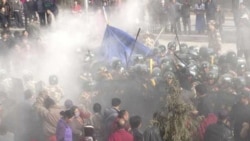“The United States is deeply concerned and saddened by the continuing violence in Tibetan areas of China and the increasing frequency of self-immolations by Tibetans,” said U.S. Under Secretary of State for Civilian Security, Democracy and Human Rights, and United States Special Coordinator for Tibetan Issues Maria Otero. “Official rhetoric that denigrates the Tibetan language, the Dalai Lama, and those who have self-immolated has further exacerbated tensions.”
The United States remains very concerned about rising tensions that result from counterproductive policies, including those that limit freedom of religion, freedom of expression, freedom of assembly and association in Tibet.
“Senior U.S. officials have directly raised the issue of Tibetan self-immolations with their Chinese government counterparts,” said Under Secretary Otero. “The U.S. government has consistently urged the Chinese government to address policies in Tibetan areas that have created tensions.”
These policies include increasingly severe government controls on Tibetan Buddhist religious practice and monastic institutions; education practices that undermine the preservation of Tibetan language; intensive surveillance, arbitrary detentions and disappearances of Tibetans, including youth and Tibetan intellectual and cultural leaders; escalating restrictions on news, media and communications; and the use of force against Tibetans seeking peacefully to exercise their universal human rights.
“We call on the Chinese government to permit Tibetans to express their grievances freely, publicly, peacefully, and without fear of retribution,” said Under Secretary Otero. “We hope that the tragic acts of self-immolation end.”
The United States will continue to raise this issue publicly and privately.
“We call on China’s leaders to allow journalists, diplomats and other observers unrestricted access to China’s Tibetan areas,” said Under Secretary Otero. “We call on the Chinese government to engage in dialogue with the Dalai Lama or his representatives without preconditions.”
The United States remains very concerned about rising tensions that result from counterproductive policies, including those that limit freedom of religion, freedom of expression, freedom of assembly and association in Tibet.
“Senior U.S. officials have directly raised the issue of Tibetan self-immolations with their Chinese government counterparts,” said Under Secretary Otero. “The U.S. government has consistently urged the Chinese government to address policies in Tibetan areas that have created tensions.”
These policies include increasingly severe government controls on Tibetan Buddhist religious practice and monastic institutions; education practices that undermine the preservation of Tibetan language; intensive surveillance, arbitrary detentions and disappearances of Tibetans, including youth and Tibetan intellectual and cultural leaders; escalating restrictions on news, media and communications; and the use of force against Tibetans seeking peacefully to exercise their universal human rights.
“We call on the Chinese government to permit Tibetans to express their grievances freely, publicly, peacefully, and without fear of retribution,” said Under Secretary Otero. “We hope that the tragic acts of self-immolation end.”
The United States will continue to raise this issue publicly and privately.
“We call on China’s leaders to allow journalists, diplomats and other observers unrestricted access to China’s Tibetan areas,” said Under Secretary Otero. “We call on the Chinese government to engage in dialogue with the Dalai Lama or his representatives without preconditions.”






